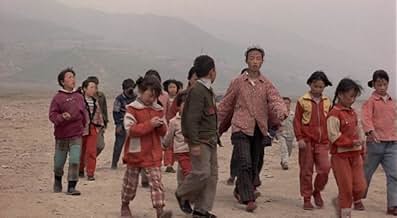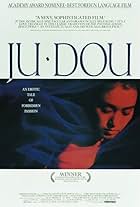IMDb RATING
7.7/10
9.6K
YOUR RATING
13-year old Wei Minzhi is the new substitute teacher of a mountain village school. She is told not to lose any of her pupils under any circumstances.13-year old Wei Minzhi is the new substitute teacher of a mountain village school. She is told not to lose any of her pupils under any circumstances.13-year old Wei Minzhi is the new substitute teacher of a mountain village school. She is told not to lose any of her pupils under any circumstances.
- Awards
- 17 wins & 10 nominations total
- Director
- Writer
- All cast & crew
- Production, box office & more at IMDbPro
Featured reviews
I am generally not a big fan of movies made only to send a message, tending to agree with the Hollywood director who famously said, If you want to send a message, go to Western Union. And make no doubt about it: this is a message movie. And in case you might miss the message, the director flashes it across the screen at the end. That said, this is a beautiful and heart warming story about an aspect of Chinese culture one generally does not hear much about in the West: the situation at rural schools. As Zhang Yimou lets us know at the end, more than one million students drop out of schools in rural China because of poverty. From what I understand, this is a pretty accurate picture of the situation in many places in the Chinese countryside. Forget about having a computer in the classroom; this place has to worry about having enough chalk. To add to the authenticity, Zhang Yimou used real people from the Chinese countryside to play the roles (although to clear up one misperception, this is not a true story). It is certainly a different China than the economic superpower we hear about in the news. But for anyone wishing to get a more complete picture of China, this film provides a vivid depiction of the plight of rural schools in a very moving if somewhat contrived story and is highly recommended.
The substitute teacher in a remote poor Chinese village is a 13 years old. Wei Minzhi plays Wei Minzhi, the mayor of a poor village plays the major of this fictional village, the teacher is the teacher, and the TV Host is the TV host...
Mr. Zhimou has created a fictional story, however, with the movie's style (as it was based in real life events) and with the use of "reliable" elements (non professional actors playing themselves), he makes it so believable, so, at about the first half of the movie, the bystander already feels identified with the film, it's touched by it, by its beauty, tenderness and sorrow.
This is not a real story, however, it shows a reality in every day China (and perhaps other countries). Since it was impossible to do a documentary criticizing the Chinese government, he made this outstanding, touching, brilliant film. 10 out of 10.
Mr. Zhimou has created a fictional story, however, with the movie's style (as it was based in real life events) and with the use of "reliable" elements (non professional actors playing themselves), he makes it so believable, so, at about the first half of the movie, the bystander already feels identified with the film, it's touched by it, by its beauty, tenderness and sorrow.
This is not a real story, however, it shows a reality in every day China (and perhaps other countries). Since it was impossible to do a documentary criticizing the Chinese government, he made this outstanding, touching, brilliant film. 10 out of 10.
I suppose 'heart warming' are the first words that come to mind but lest that put anyone off, I have to say that it is the way Mr Zhang involves us from the very beginning that is the reason for the film's success. Beautifully shot with some wonderful natural light, our first glimpse of the rural backwater is astonishing. Almost immediately though we are drawn into a drama involving a thirteen year old girl being put in charge of a school of youngsters. The usual teacher has to visit sick relatives for a month and he leaves the girl behind with specific instructions to keep the schoolchildren from leaving school. Hence the film's title. Of course one goes missing and she follows to the city to try and find him, which becomes the story of the film. It is fascinating to see and believe the degree of poverty in the village and wonder as the children do at the difficulty of surviving in either place. The young girl may be acting less out of altruism than self interest but our eyes do not leave her and her concerns are ours. Seemingly non professional cast do a magnificent job, which must in no small part be down to Zhang, but then nobody seems to put a foot wrong. Excellent.
It might be a good idea to show this film in all schools in the `civilised' world! This is, anyway, a delightful story for all the family, hugely enjoyable, simply and lovingly told, and with just the most marvellous little Chinese girl imaginable! She has to stand in for the local schoolmaster who very definitely must go and visit his mother who is ill and dying. He leaves her in the middle of about twenty kids only a couple of years younger than herself to get on with the job as best she can, so as to earn 50 yuan in a school which is falling apart.
Now you might think that such a building could not possibly be a schoolhouse in remote rural China, or anywhere else. I assure you I have seen such schools and not in such remote areas in Indonesia, India, Afghanistan and in what was Portuguese Timor. Even here in Spain, in rural villages high up in the sierras, my wife has worked in schools in little villages where either the floorboards were rotting under her feet in front of the blackboard, or the plumbing did not work, or the lights did not switch on when you wanted them to, or the wood-burning stove in the middle of the room gave off billows of smoke so that you had to open the windows with 10ºC below zero outside, or the window panes had no putty in them, and so on. And this, only a few years ago, in a modern, civilised European country.
Minzhi Wei playing the part of Wei Minzhi, who is herself with her own name (in Chinese the surname is put first) is a thirteen year old who will never make it to Hollywood, but is just the most beautiful school mistress you could imagine! I will not say anything about the story: you can see it for yourself. This young girl had to do it all she is barely ever off the screen.
Yimou Zhang has given us a little gem, a beautiful story, with such wonderful participation by all those children, as well as the fine photography and Bao San's occasional accompanying music.
How nice to see a lovely story so naturally told! Can't we do things like this in Europe and the USA without it being all violence or overladen commercialism for the hungry masses? Can't we tell a real human story without all the technological special effects? Can't we make honest cinema .?
Now you might think that such a building could not possibly be a schoolhouse in remote rural China, or anywhere else. I assure you I have seen such schools and not in such remote areas in Indonesia, India, Afghanistan and in what was Portuguese Timor. Even here in Spain, in rural villages high up in the sierras, my wife has worked in schools in little villages where either the floorboards were rotting under her feet in front of the blackboard, or the plumbing did not work, or the lights did not switch on when you wanted them to, or the wood-burning stove in the middle of the room gave off billows of smoke so that you had to open the windows with 10ºC below zero outside, or the window panes had no putty in them, and so on. And this, only a few years ago, in a modern, civilised European country.
Minzhi Wei playing the part of Wei Minzhi, who is herself with her own name (in Chinese the surname is put first) is a thirteen year old who will never make it to Hollywood, but is just the most beautiful school mistress you could imagine! I will not say anything about the story: you can see it for yourself. This young girl had to do it all she is barely ever off the screen.
Yimou Zhang has given us a little gem, a beautiful story, with such wonderful participation by all those children, as well as the fine photography and Bao San's occasional accompanying music.
How nice to see a lovely story so naturally told! Can't we do things like this in Europe and the USA without it being all violence or overladen commercialism for the hungry masses? Can't we tell a real human story without all the technological special effects? Can't we make honest cinema .?
Long after De Sica made "Bicycle thief" and Fellini his "La Strada," neo-realist traditions grab me like no other in cinema history. The Chinese film "Not one less" made half a century after the Italian masterpieces, underlines several aspects of neo-realist traditionsnon-actors can transform into great actors provided you have an intelligent script and a talented director, poverty attracts anyone with a conscience, the candid camera is a marvelous tool, and human values exist to be appreciated irrespective of national boundaries. It truly deserved the Golden Lion at the Venice film festival.
A reluctant substitute teacher taking on a job that would fetch a doubtful "50 yuan" from a village mayor with questionable priorities transforms into a national hero in less than a month as she strives hard to ensure the number of her students do not dwindle until the regular teacher returns. Her resolutions transforms the economic state of the school, makes her students into socially responsible "young adults" and teaches a lesson to the wily mayor, a gatekeeper in the city TV station who goes by rules rather than by her discretion.
The brilliance of the film is that the film hooks the audience as a thriller would until the film ends. Yet there is no sex, no violence, no beautiful face, no delightful music or engaging camera anglesonly reactions caught by candid camera (at least most of the time).
The most poignant comment was the young student's comment "I loved the city but it made me beg for food" For a contemporary Chinese film made under tight censorshipthe film's director Yimou Zhang seems to offer layers of comment beyond the obvious story line. Did Teacher Wei do what she did for the sake of money or as a responsible teacher? Are you likely to forget propagandist songs but recall simple songs on family values? Are individual greatness (teacher Wei) more appreciated than group actions (school as a group, nation's need for good athletes overriding permission of the parents of potential athletes)? Is the richness of rural lifestyles discounted by rising urban materialism? Does it require an individual's actions to underline the demands of the rural poor? These are hidden questions for each viewer to answer.
I have only seen one other film of director Yimou Zhang and that is "Red Sorghum". "Not one less" towers over "Red Sorghum" in every department of film-making.
I saw this Chinese film on an Indian TV channel. I only wish more such international films get shown widely on TV throughout the world. It would raise the bar of what constitutes good cinema to many who currently have little idea of good cinema except those made in their own countries. Recent mainland Chinese films like "Peacock" and "Not one less" have established their world class credentials.
P.S. I was more than amused to find Ford and Coca-Cola financed the film in part, which is probably why the school kids in a remote Chinese village know about Coke and relish rationed drops of the liquid. Who was pulling whose leg here???
A reluctant substitute teacher taking on a job that would fetch a doubtful "50 yuan" from a village mayor with questionable priorities transforms into a national hero in less than a month as she strives hard to ensure the number of her students do not dwindle until the regular teacher returns. Her resolutions transforms the economic state of the school, makes her students into socially responsible "young adults" and teaches a lesson to the wily mayor, a gatekeeper in the city TV station who goes by rules rather than by her discretion.
The brilliance of the film is that the film hooks the audience as a thriller would until the film ends. Yet there is no sex, no violence, no beautiful face, no delightful music or engaging camera anglesonly reactions caught by candid camera (at least most of the time).
The most poignant comment was the young student's comment "I loved the city but it made me beg for food" For a contemporary Chinese film made under tight censorshipthe film's director Yimou Zhang seems to offer layers of comment beyond the obvious story line. Did Teacher Wei do what she did for the sake of money or as a responsible teacher? Are you likely to forget propagandist songs but recall simple songs on family values? Are individual greatness (teacher Wei) more appreciated than group actions (school as a group, nation's need for good athletes overriding permission of the parents of potential athletes)? Is the richness of rural lifestyles discounted by rising urban materialism? Does it require an individual's actions to underline the demands of the rural poor? These are hidden questions for each viewer to answer.
I have only seen one other film of director Yimou Zhang and that is "Red Sorghum". "Not one less" towers over "Red Sorghum" in every department of film-making.
I saw this Chinese film on an Indian TV channel. I only wish more such international films get shown widely on TV throughout the world. It would raise the bar of what constitutes good cinema to many who currently have little idea of good cinema except those made in their own countries. Recent mainland Chinese films like "Peacock" and "Not one less" have established their world class credentials.
P.S. I was more than amused to find Ford and Coca-Cola financed the film in part, which is probably why the school kids in a remote Chinese village know about Coke and relish rationed drops of the liquid. Who was pulling whose leg here???
Did you know
- TriviaYimou insisted on capturing natural reactions from the amateur actors. To achieve this, he often used hidden cameras and microphones. This resulted in a film-shot to film-used ratio of 35 to 1. Normally, because of cost, the ratio should be 3.5 to 1. However, because the film was shot on 16mm (an later blown up to 35mm), the price was about the same because of the cheaper film stock.
- Quotes
TV Host: Do you like the city?
Zhang Huike: Yes.
TV Host: What is good about it?
Zhang Huike: The city is beautiful and prosperous. Much better than the country.
TV Host: What's the most lasting impression?
Zhang Huike: That I had to beg for food. I will always remember that.
- How long is Not One Less?Powered by Alexa
Details
Box office
- Gross US & Canada
- $592,586
- Opening weekend US & Canada
- $50,256
- Feb 21, 2000
- Gross worldwide
- $592,586
Contribute to this page
Suggest an edit or add missing content
























